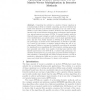Free Online Productivity Tools
i2Speak
i2Symbol
i2OCR
iTex2Img
iWeb2Print
iWeb2Shot
i2Type
iPdf2Split
iPdf2Merge
i2Bopomofo
i2Arabic
i2Style
i2Image
i2PDF
iLatex2Rtf
Sci2ools
167
click to vote
ARC
2010
Springer
2010
Springer
Optimising Memory Bandwidth Use for Matrix-Vector Multiplication in Iterative Methods
Computing the solution to a system of linear equations is a fundamental problem in scientific computing, and its acceleration has drawn wide interest in the FPGA community [1–3]. One class of algorithms to solve these systems, iterative methods, has drawn particular interest, with recent literature showing large performance improvements over general purpose processors (GPPs). In several iterative methods, this performance gain is largely a result of parallelisation of the matrixvector multiplication, an operation that occurs in many applications and hence has also been widely studied on FPGAs [4, 5]. However, whilst the performance of matrix-vector multiplication on FPGAs is generally I/O bound [4], the nature of iterative methods allows the use of onchip memory buffers to increase the bandwidth, providing the potential for significantly more parallelism [6]. Unfortunately, existing approaches have generally only either been capable of solving large matrices with limited improveme...
Related Content
| Added | 18 May 2010 |
| Updated | 18 May 2010 |
| Type | Conference |
| Year | 2010 |
| Where | ARC |
| Authors | David Boland, George A. Constantinides |
Comments (0)

